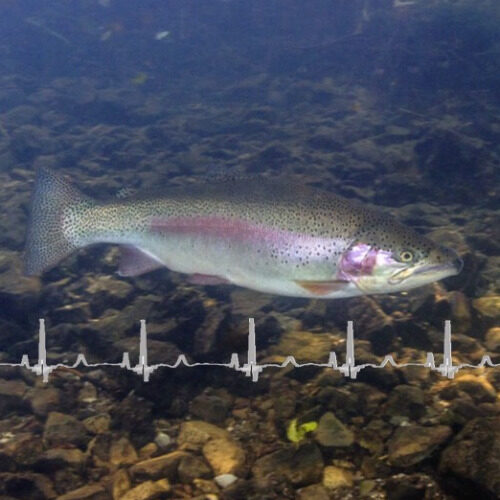
Animal Physiology
Leaders
Contact persons
Animals are exposed to natural and anthropogenic environmental stresses that affect animal life at all levels of biological organization, from molecules and cells to organs, individuals, and populations. We study the physiological adaptation and acclimation of ectothermal animals, mainly fish, and their adaptation to abiotic environmental conditions in the northern and arctic regions. In particular, the effects of temperature and oxygen availability on the cardiovascular function of fish under seasonally changing conditions are investigated. Our research topics include thermal adaptation and acclimation of fishes, the use of zebrafish as an animal model in thermal biology of ectotherms and human cardiac electrophysiology, and combined effects of thermal stress and environmental toxicants on fish cardiovascular function.
Cooperation
Files
1 itemsKeywords
Leaders
Senior Researchers
-

Jaakko Haverinen
Project ResearcherDepartment of Environmental and Biological Sciences, Faculty of Science, Forestry and Technology -
Vesa Paajanen
University LecturerDepartment of Environmental and Biological Sciences, Faculty of Science, Forestry and Technology
Technicians
Contact persons
Publications
32 items-
Cardiac arrhythmias in fish induced by natural and anthropogenic changes in environmental conditions
Vornanen, Matti; Badr, Ahmed; Haverinen, Jaakko. 2024. Journal of experimental biology. 227: . jeb247446 A2 Review article, Literature review, Systematic review -
Electrical excitation, action potential and impulse conduction
Vornanen, Matti; Badr, Ahmed; Haverinen, Jaakko. Teoksessa: Alderman, Sarah L.; Gillis, Todd E(toim.) , 2024. Encyclopedia of Fish Physiology. s. 55-62. Academic press B2 Book section -
Dual effect of polyaromatic hydrocarbons on sarco(endo)plasmic reticulum calcium ATPase (SERCA) activity of a teleost fish (Oncorhynchus mykiss)
Haverinen, Jaakko; Badr, Ahmed; Korajoki, Hanna; Hassinen, Minna; Vornanen, Matti. 2023. Comparative biochemistry and physiology c: toxicology and pharmacology. 2024; 276: A1 Journal article (refereed), original research -
Three steps down: Metabolic depression in winter-acclimatized crucian carp (Carassius carassius L)
Haverinen, Jaakko; Badr, Ahmed; Eskelinen, Markus; Vornanen, Matti. 2023. Comparative biochemistry and physiology a: molecular and integrative physiology. 2024; 287: A1 Journal article (refereed), original research -
Dual effect of metals on branchial and renal Na,K-ATPase activity in thermally acclimated crucian carp (Carassius carassius) and rainbow trout (Oncorhynchus mykiss)
Haverinen, Jaakko; Vornanen, Matti. 2022. Aquatic toxicology. 2023; 254: A1 Journal article (refereed), original research -
Effect of Channel Assembly (KCNQ1 or KCNQ1 + KCNE1) on the Response of Zebrafish IKs Current to IKs Inhibitors and Activators
Haverinen, Jaakko; Hassinen, Minna; Vornanen, Matti. 2022. Journal of cardiovascular pharmacology. 79: 670-677 A1 Journal article (refereed), original research -
Expression of calcium channel transcripts in the zebrafish heart: dominance of T-type channels
Haverinen, Jaakko; Hassinen, Minna; Dash, Surjya Narayan; Vornanen, Matti. 2018. Journal of experimental biology. 221: jeb179226 A1 Journal article (refereed), original research -
Small functional If current in sinoatrial pacemaker cells of the brown trout (Salmo trutta fario) heart despite strong expression of HCN channel transcripts
Hassinen Minna, Haverinen Jaakko, Vornanen Matti. 2017. American journal of physiology : regulatory integrative and comparative physiology. 313: R711-R722 A1 Journal article (refereed), original research -
Deltamethrin is toxic to the fish (crucian carp, Carassius carassius) heart
Haverinen Jaakko, Vornanen Matti. 2016. Pesticide biochemistry and physiology. 129: 36-42 A1 Journal article (refereed), original research -
Effects of prolonged anoxia on electrical activity of the heart in Crucian carp (Carassius carassius)
Tikkanen Elisa, Haverinen Jaakko, Egginton Stuart, Hassinen Minna, Vornanen Matti. 2016. Journal of experimental biology. 2017; 220: 445-454 A1 Journal article (refereed), original research
